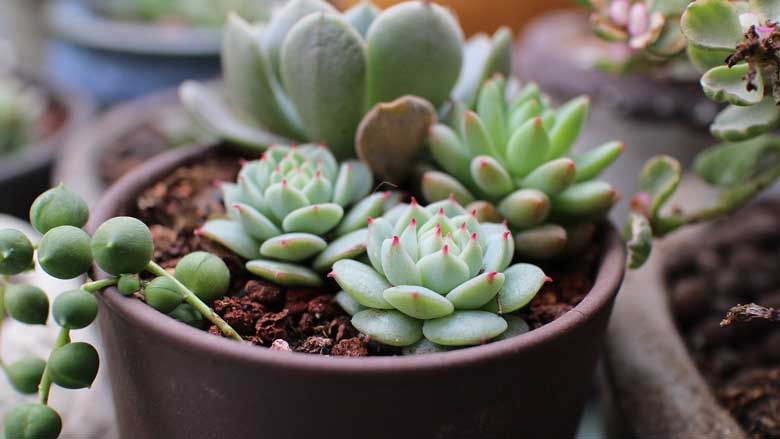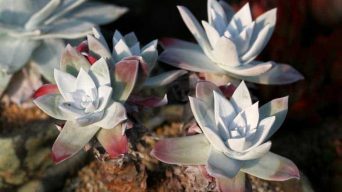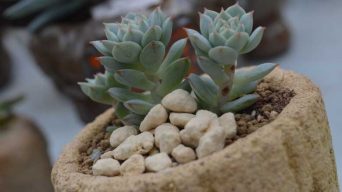Like most succulent growers, you want to do everything possible to ensure your plants thrive.
Succulents are tough plants that usually thrive with little to no care, but you can do a few things to give them an extra boost.
One of those things is fertilizing your succulents.
But do succulents need fertilizer? What kind of fertilizer should you use? And how often do you need to fertilize them?
This blog post will answer all of your questions about fertilizing succulents!
Do You Need to Fertilize Succulents?
Succulents do not always require fertilizer, but they will benefit like other plants.
Fertilizer helps give your plants the nutrients they need to grow big and strong.
If you do not fertilize them, your plants will still do just fine, but they may not be as healthy or vibrant as they could be with a little extra help.
Succulents do best in soil that is rich in nutrients.
So if you do not fertilize your succulents, ensure the potting soil you use is high quality.
If you do not have a high-quality potting mix, your plants will do much better with some fertilizer.
Feeding succulents can also help give them an extra energy boost to grow more quickly and flower more frequently.
If you do not use fertilizer, your plants will still do just fine if they are in the right conditions and have access to plenty of sunshine.
They should thrive without additional fertilization if they get enough light, water, and nutrients from the soil.
But adding a little extra food now and then can do wonders for your succulents!
When Should I Fertilize My Succulents?
The best time to fertilize your succulents is when they are actively growing. This usually happens in the spring and summer, when the days are longer and warmer.
During the winter months and other times when your plants do not have access to enough light, do not fertilize them at all.
When the days are shorter and less sunlight is available for photosynthesis, succulents will grow more slowly or even stop growing altogether.
When this happens, do not fertilize them because it will do more harm than good!
Instead of using the energy to grow new leaves or stems, they will spend energy processing fertilizer. They could end up dying from a lack of nutrients themselves.
But you can fertilize your succulents at any time of year as long as they are actively growing.
If you need to know whether your plants are growing or not, wait until they show new growth before you fertilize them.
If you are still determining when that will be, do not worry! Your succulents should do just fine without any additional fertilization.
As long as they get enough light and water to stay healthy, they do not need extra food.
But if you want your succulents to grow faster or flower more frequently, adding a little fertilizer can be helpful.
Fertilize your succulents when they are most active, and you will see the best results!
How Often Should You Fertilize Succulents?
When it comes to fertilizing succulents, less is more. Overfertilizing your plants can do more harm than good!
If you decide to use fertilizer, only do so once every few months during the spring growing season (spring and summer).
Fertilize your succulents in early spring, when they begin to grow again after their winter dormancy. Then do it once or twice during the summer, about every two months.
Do not fertilize your succulents in the fall or winter, as this is when they go dormant and do not need any extra nutrients.
If you fertilize your succulents too often, the excess fertilizer can burn their roots or cause them to grow too quickly. Overfertilization makes them more susceptible to overwatering, root rot, or other problems.
Only fertilize them once every two months during the growing season to prevent this from happening.
If you do not have time to fertilize regularly, do not worry.
They do not require any extra nutrients from fertilizer and will do just fine without additional food.
It is better to skip the fertilizer than overfertilize them!
But if you want your plants to reach their full potential, adding extra food now and then will do wonders for them.
You should also avoid fertilizing your succulents after they have been repotted or potted up in new soil.
The nutrients from the fertilizer can burn their roots before they have time to adjust to their new environment!
What Kind of Fertilizer Is Best for Succulents?
There are many different types of fertilizer on the market, but not all are good for succulents.
When it comes to succulents, you want to use a balanced fertilizer low in nitrogen and high in phosphorus and potassium.
Nitrogen helps plants grow, but too much can do more harm than good for succulents.
It is best to use a fertilizer with less nitrogen and more phosphate and potassium, the other two nutrients found in most plant fertilizers.
A balanced liquid fertilizer diluted to half-strength is ideal for succulents.
You can also use a slow-release fertilizer, releasing nutrients into the soil over time.
Just make sure it is low in nitrogen and phosphorus, and potassium!
When you are looking for an excellent succulent fertilizer, keep these things in mind:
- Do not use manure or compost, as they are high in nitrogen and can do more harm than good for your plants.
- Do not use a fertilizer diluted to full strength, as this will burn their roots!
- Do not apply any fertilizer during the winter months when succulents go dormant.
- Use a balanced, low-nitrogen fertilizer that is high in phosphorus and potassium.
An excellent succulent plant fertilizer is specifically made for cacti and succulents. You can dilute a balanced liquid fertilizer to half-strength.
Just ensure it does not contain any manure or compost, which are high in nitrogen and can do more harm than good!
How Much Fertilizer Do Succulents Need?
When fertilizing succulents, use less fertilizer. A little goes a long way!
Succulents do not need a lot of fertilizer to stay healthy and grow at a normal rate.
If liquid fertilizer is used, do not dilute it to full strength.
Instead, mix one part of the diluted solution with two parts of water and apply this mixture once every few months during the growing season.
For slow-release fertilizer pellets, follow the instructions on the package for how much to use.
But remember, a little goes a long way!
You do not need to fertilize your succulents every week or month.
A good rule of thumb is to fertilize them once every two months during the spring and summer, usually between April and September.
If you do not want to fertilize your succulents every two months, do not worry!
They will do just fine without any extra succulent plant food and will still grow at a normal rate.
If you do want to give them some extra nutrients or if you do not have time to fertilize them every two months, do not worry.
You can skip the feeding for a month or two and then resume regular feeding afterward.
If your succulents get enough water and light during these times, they will do just fine without any additional plant food!
How to Fertilize Succulents: A Step-by-Step Guide
Now that you know about succulent plant fertilizers, let’s look at how to fertilize them properly.
The best way to fertilize succulents is with a balanced liquid fertilizer diluted to half-strength.
The following steps will show you exactly how to do it:
1. Water Your Plants Well and Then Allow the Soil To Dry Out
This is a crucial step to do before fertilizing succulents. You want the potting soil in your pots or containers to be dry before applying fertilizer. This helps prevent root rot on succulents, which you do not want!
After watering your succulents, wait until the top of the soil has dried before applying any fertilizer. This usually takes a day or two but may take longer in cool or humid weather.
If your succulents are planted in the ground, wait to water them before applying fertilizer.
If you do this too often, then it will create a weak root system and do more harm than good!
2. Prepare the Fertilizer
Once the soil has dried, it’s time to prepare the fertilizer.
You want to use a balanced liquid fertilizer diluted to half-strength. This means you should mix one-part fertilizer with two parts water.
Don’t apply the full-strength liquid fertilizer directly to your succulents, as this can burn them!
If you’re using a granular fertilizer, it’s essential to dissolve it in water before applying it. Otherwise, the fertilizer will sit on top of the soil and not do anything!
3. Add the Fertilizer to the Soil
After the fertilizer has been diluted to half-strength, it’s time to pour it over your plants.
Water your succulents with the diluted fertilizer until it starts draining out of their pots or containers.
If you do not do this, your succulents will not get enough nutrients from the fertilizer.
4. Don’t Water Your Succulents for a Week
After fertilizing your succulents, do not water them for at least one week. This will allow the fertilizer to soak into the soil and give your plants a good dose of nutrients!
During this time, keep an eye on your succulents and ensure they’re not wilting or losing color.
If they are, then you may need to water them sooner!
After a week has passed, it’s safe to water succulents normally.
You can do this by checking the soil moisture levels and watering them when the top of the soil feels dry.
Succulents do not like to sit in water, so do not overwater them!
Final Thoughts
Growing succulents is easy, but they need the proper care. But do succulents need fertilizer?
In general, most succulents do not need to be fertilized very often. A light fertilizer application every month or two during the growing season should be enough.
Too much fertilizer can harm succulent plants, so it’s essential to be careful when applying it.
In most cases, less is more when it comes to succulent care.
If you decide to fertilize your plants, start slow and work your way up if necessary.
Some people do not fertilize their succulents since they do better with less or no fertilizer.
Succulent plants are generally quite hardy and will do well even if you do not fertilize them often.







